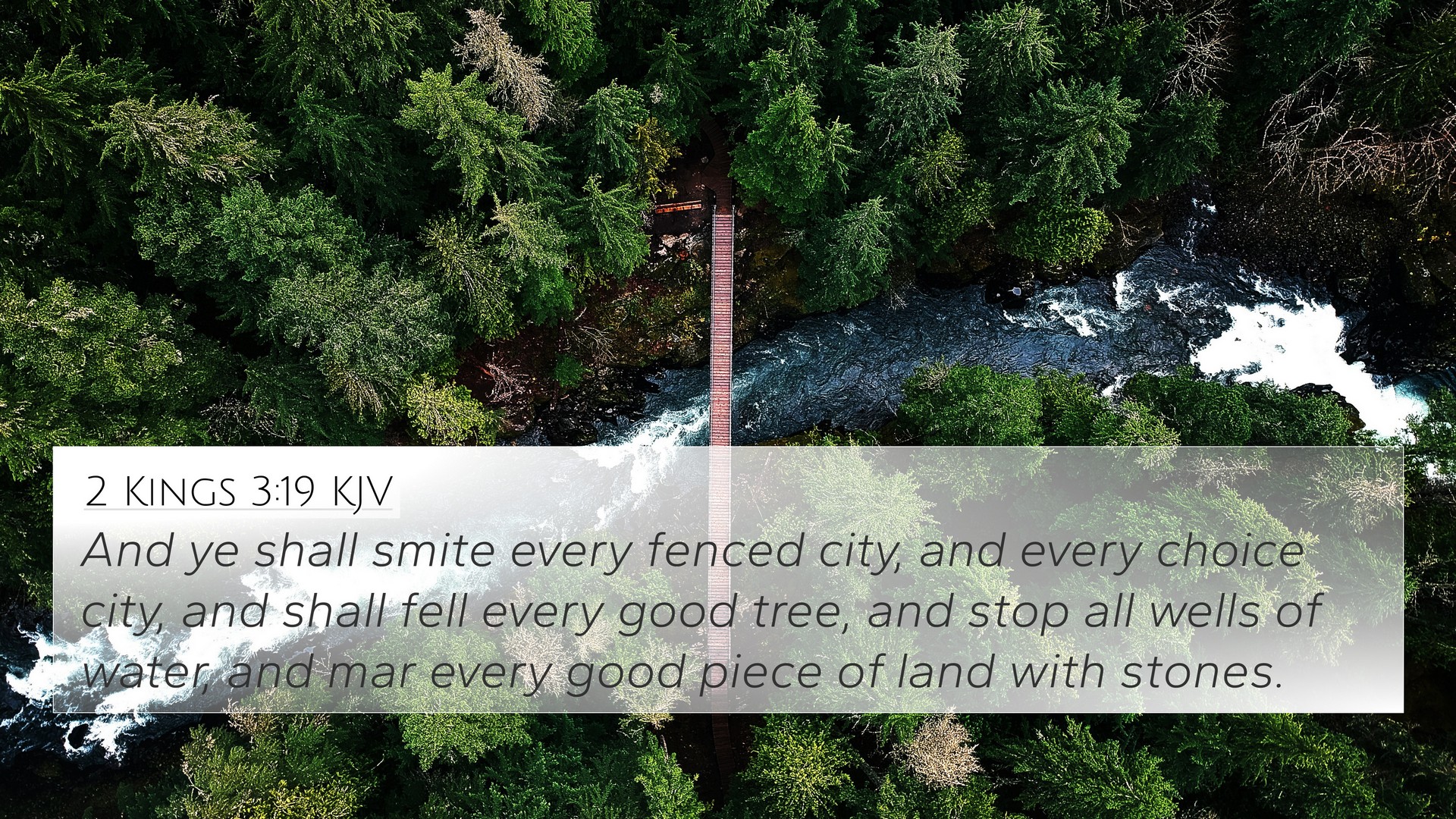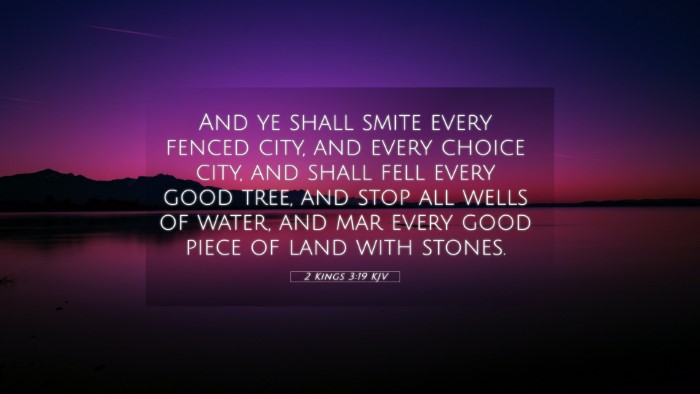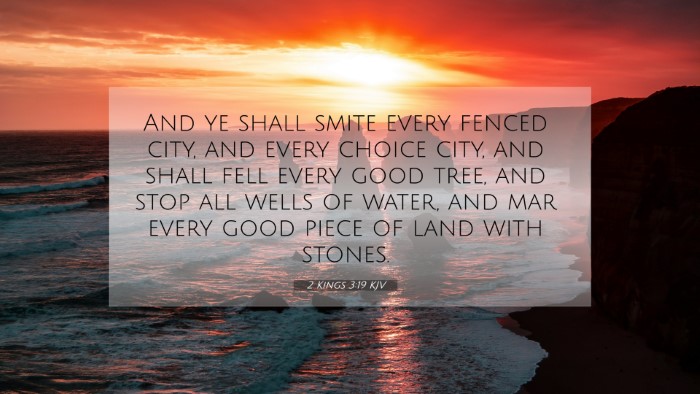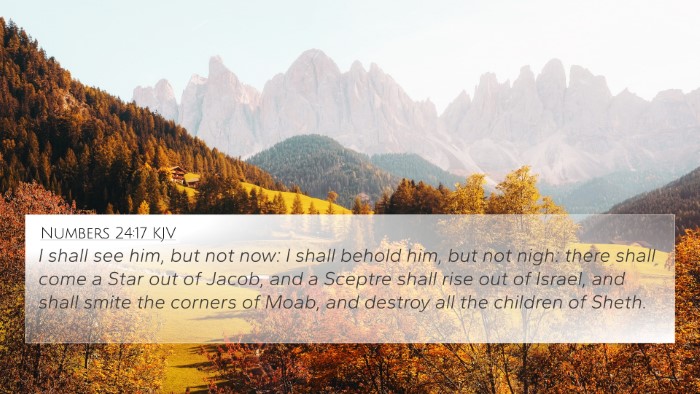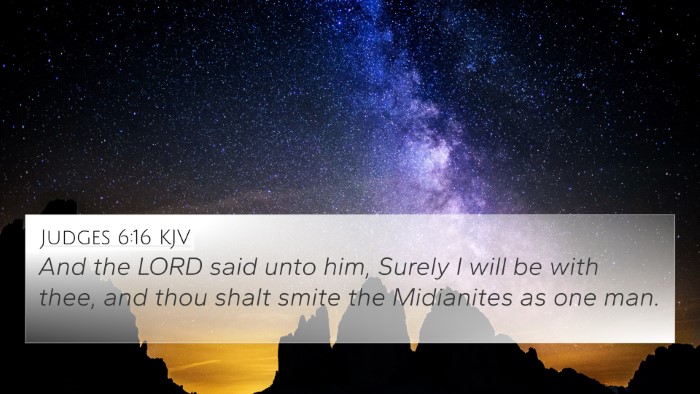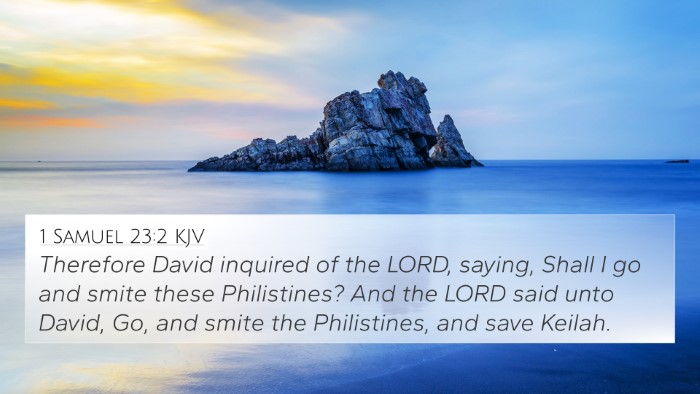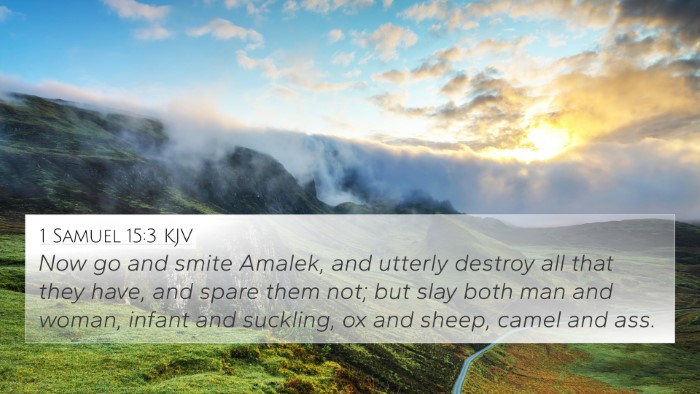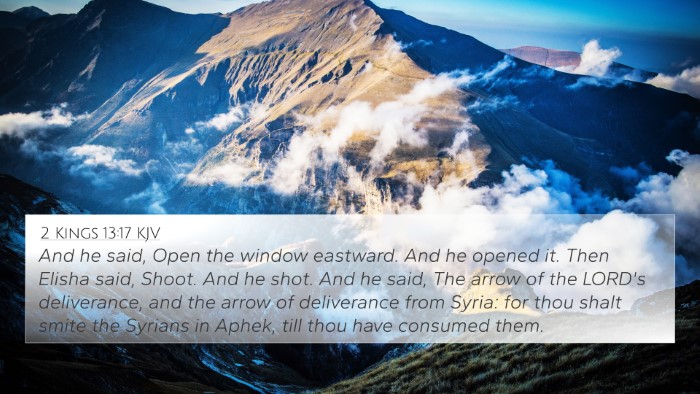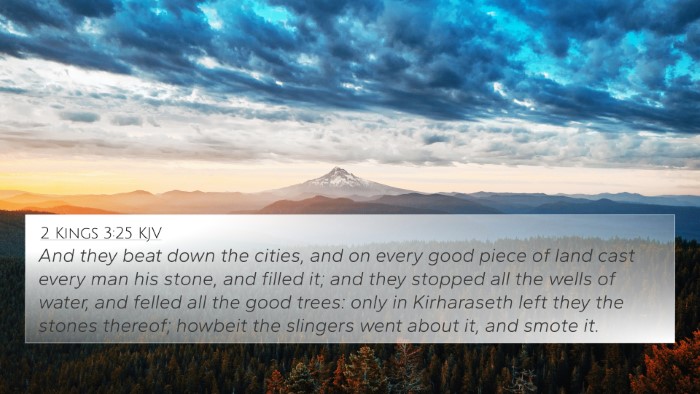Understanding 2 Kings 3:19
Verse: "And ye shall smite every fenced city, and every choice city, and shall fell every good tree, and stop all wells of water, and mar every good piece of land with stones."
This verse from 2 Kings outlines a prophetic instruction given by Elisha regarding the military campaign against Moab. Here, we delve into the meaning and implications of this command using insights derived from various public domain commentaries.
Contextual Background
The events leading to this verse involve a coalition of Israel, Judah, and Edom coming together to confront the rebellious Moabite king. The dire circumstances of battle introduce the necessity for divine guidance, which Elisha, as a prophet, provides.
Insights from Commentaries
- Matthew Henry: Henry emphasizes that the Lord's commands through the prophet are not merely military directives but emphasize the Lord’s sovereignty and the seriousness of their sin. He interprets the act of destroying trees and wells as a symbolic gesture aimed at crippling Moab’s resources, indicating that victory is predicated on complete submission to God’s plans.
- Albert Barnes: Barnes highlights the severity of the destruction as a means of discouraging future rebellion against Israel. He notes that the phrase “every fenced city” reflects a totality of conquest, asserting that this was God’s method to humble the proud nation of Moab and thus restore order.
- Adam Clarke: Clarke discusses the implications of “fenced cities” and “choice cities,” stressing the significance of these locations in Moab. He ties the actions back to the covenant of conquest that God had with Israel and suggests that such a determined strike against the enemy serves as divine judgment on Moab’s persistent hostility.
Thematic Connections
This verse exhibits profound themes relevant throughout the Bible, particularly regarding the covenant relationship between God and Israel. Through examining other scriptures, the reader can discern connections illustrating God’s judgment, mercy, and the importance of obedience. Here are some relevant cross-references:
- Deuteronomy 20:19-20: Discusses the rules of warfare and the treatment of fruit-bearing trees, likening it to the directive given by Elisha.
- Joshua 6:20: Relates to the fall of Jericho, showcasing God’s power in delivering victory to Israel.
- 1 Samuel 15:3: God's command to Saul regarding the destruction of the Amalekites underscores themes of divine judgment.
- Isaiah 15:6: Illustrates the desolation of Moab, echoing the results of warfare as expressed in 2 Kings.
- 2 Chronicles 20:22-23: The Lord’s intervention in battle mirrors God’s ongoing support for His people against their enemies.
- Jeremiah 48:1-2: Contains prophecies against Moab that reflect the outcomes shared in our verse, symbolizing a time of judgment.
- Luke 14:31-32: A New Testament perspective on evaluating the cost of conflict embodies the wisdom illustrated in military strategy from the Old Testament.
- James 4:2: Highlights conflicts stemming from desires, potentially revealing underlying spiritual lessons regarding unrest between nations.
- Romans 8:31: Encourages believers that if God be for us, who can be against us, resonating with Israel’s reliance on God through military ventures.
- Revelation 19:11-16: A prophetic vision of ultimate conquest where Christ defeats His enemies parallels the themes of victory in the scripture.
Application for Today
Through this verse, one can explore the seriousness of obedience to God’s commands as well as the consequences of sin. In a modern context, the verse serves as a reminder that God often employs difficult experiences to bring about righteousness and justice. Furthermore, it invites reflection on how Christians approach conflicts in their lives—whether physical, emotional, or spiritual.
Connecting Themes and Cross-References
This verse encourages us to engage in inter-Biblical dialogue, where connections between scriptures reveal deeper spiritual truths. Here are ways to utilize this knowledge:
- Utilizing Bible concordances to understand terms and themes related to judgment and conquest.
- Employing a cross-reference guide during study sessions to explore the cohesiveness of God’s plan throughout Biblical narratives.
- Engaging in Bible cross-reference study to deepen understanding of both Old Testament and New Testament teachings on obedience and divine authority.
- Using comprehensive Bible cross-reference materials that identify thematic parallels creating a richer understanding of scripture.
- Identifying connections between Bible verses that explore the nature of God’s justice and mercy, echoing through various Biblical accounts.
Conclusion
2 Kings 3:19 offers a complex picture of God’s involvement in the affairs of nations and serves as a stark reminder of the consequences of sin. By cross-referencing with other Biblical texts, believers can uncover an intricate tapestry of God’s message through scripture. Thus, cross-referencing Bible verses not only enriches the study but elucidates God’s character and His continual engagement with humanity.
